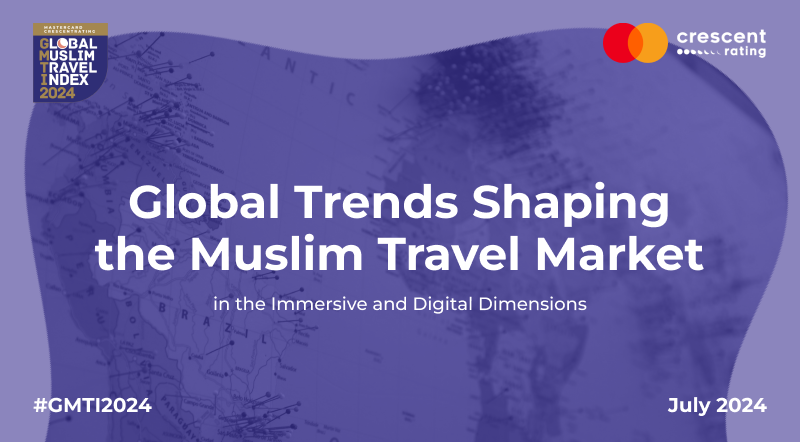
The Muslim travel market, a rapidly expanding segment within the global tourism industry, is seeing a transformation in the experiences sought by its travelers. Emphasizing responsible and immersive travel, Muslim tourists are exploring new destinations and seeking deeper, more meaningful engagements with the places they visit. This shift is driven by several global trends that are reshaping how Muslim travelers interact with the world, aligning with core faith traditions of community, stewardship, and respect for diversity.
Overtourism has become a significant concern in many popular destinations, leading to environmental degradation and loss of cultural heritage. For Muslim travelers, particularly those visiting cultural and heritage sites, managing overtourism is crucial. By controlling visitor numbers and implementing sustainable tourism practices, these sites can maintain their sanctity and ambiance, providing a more personal and reflective experience for visitors.
Community-based tourism is gaining traction as it allows local communities to showcase their culture, traditions, and lifestyle. This approach promotes sustainable economic growth by engaging directly with local communities, offering travelers authentic interactions, and supporting local economies. For Muslim travelers, this aligns with the faith traditions of community support and ethical spending, providing a deeper connection to the places they visit.
Accessibility is a key consideration in the Muslim travel market due to the community-oriented nature of travel in Muslim cultures. Many Muslim travelers often journey with extended family groups, including elderly members and small children. Ensuring that tourist attractions and services are accessible to all, regardless of physical ability, enhances the travel experience and ensures inclusivity.
Muslim travelers often seek to connect with the Islamic history of their destinations. Visiting historical mosques and Islamic landmarks provides an in-depth understanding of local culture, history, and people, enriching their faith and their appreciation of global Muslim heritage. This deep cultural immersion offers a more meaningful travel experience.
Exploring local Halal cuisines is a significant aspect of the Muslim travel experience. Authentic local food experiences go beyond standard offerings to include local culinary specialties. This not only enhances the cultural and culinary experience for Muslim travelers but also supports local businesses and promotes culinary diversity.
Participating in local festivals allows travelers to experience culture, traditions, and celebrations firsthand. Engaging in Islamic festivals like Eid or Ramadan in different cultural contexts deepens faith and fosters a sense of global community among Muslim travelers. This trend underscores the importance of cultural exchange and shared religious experiences.
Environmental responsibility is a growing trend among travelers, including those in the Muslim travel market. Eco-conscious travel practices that minimize ecological impact align with the Islamic principle of stewardship of the earth. Muslim travelers are increasingly choosing eco-friendly destinations and practices that conserve nature, reflecting their commitment to protecting the environment.
The modernization of the travel industry through technological advancements is reshaping the travel landscape for today’s connected traveler. These digital trends are enhancing travel experiences, making them more seamless and integrated than ever before.
The shift towards cashless transactions is revolutionizing the travel industry. Digital payment methods such as credit and debit cards, mobile wallets, and contactless payments are becoming increasingly prevalent. These methods provide a safer, more convenient, and streamlined financial experience for travelers, reducing the need to carry large amounts of cash and facilitating quicker transactions. Additionally, cashless systems offer easier tracking and management of expenses, helping travelers maintain better control over their budgets.
Artificial intelligence is playing a crucial role in customizing travel experiences, offering recommendations, and providing customer support through chatbots and virtual assistants. For Muslim travelers, AI can help locate Halal food options, prayer spaces, and even translate local languages, simplifying travel logistics while adhering to faith traditions.
Streamlining entry and exit processes at borders through advanced technologies is transforming international travel. E-gates, biometric verification, and automated passport control systems reduce wait times and improve efficiency. A key innovation is the use of QR codes as digital travel credentials, storing encrypted data about the traveler’s identity and travel details. This method, currently being tested in some destinations, speeds up the immigration process, making it less cumbersome for travelers and reflecting a broader move towards digitization in travel.
The digital nomad lifestyle is a growing trend where individuals leverage technology to work remotely while traveling. Enabled by advancements in digital communication, cloud computing, and mobile technology, digital nomads can work from virtually anywhere with a reliable internet connection. This trend is particularly appealing to younger Muslim travelers seeking to balance work and travel while exploring the world.
Visit this link to download the GMTI 2024 full report!